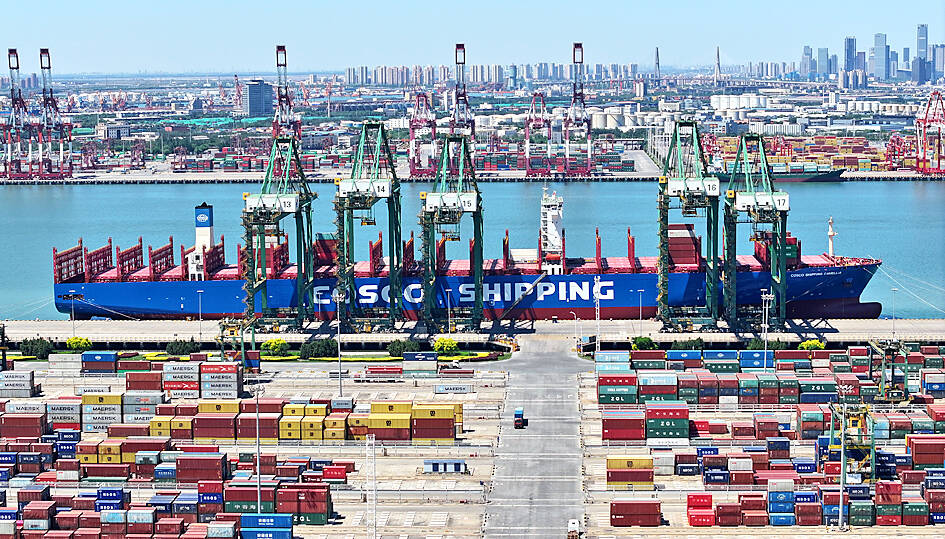Some of the steep US tariff increases on an array of Chinese imports, including electric vehicles (EVs) and their batteries, computer chips and medical products, would take effect on Aug. 1, the US Trade Representative’s office said yesterday.
US President Joe Biden would keep tariffs put in place by former US president Donald Trump while ratcheting up others, including a quadrupling of import duties on Chinese EVs to more than 100 percent and a doubling of semiconductor duties to 50 percent.
The trade agency said in a federal notice that a 30-day public comment period would close on June 28.

A container ship is berthed at the Pacific International Container Terminal of the Port of Tianjin in China on Wednesday last week.
It is seeking comments on the effects of the proposed tariff increase on the US economy, including consumers, and on whether a proposed 25 percent duty on medical masks, gloves and syringes should be higher.
The notice also provides specific tariff codes for 387 product categories affected, along with new duty rates and implementation dates.
Tariffs starting next year and in 2026 would start on Jan. 1 for those years, the trade agency said.
The proposed Chinese tariff increases include “products targeted by China for dominance, or are products in sectors where the United States has recently made significant investments,” it said.
Washington is investing hundreds of billions of dollars in clean energy tax subsidies to develop EV, solar and other new industries, and has said that China’s state-driven excess production capacity in these sectors threatens the viability of US firms.
The tariffs are meant to protect US jobs from a feared flood of cheap Chinese imports.
The new measures would affect US$18 billion in imported Chinese goods, including steel and aluminum, semiconductors, EVs, critical minerals, solar cells and cranes, the White House said.
The EV figure might have more of a political than a practical impact in the US, which imports few Chinese EVs because of prior vehicle tariffs.
The largest two categories, making up US$13.2 billion of the targeted imports from China last year, are lithium-ion batteries, US Census Bureau trade data showed.
Duties of 25 percent are due to start in 2026 on the US$10.9 billion non-vehicle lithium-ion battery category, which has grown quickly and is the third-largest US import category from China after smartphones and personal computers.
The US imported US$427 billion in goods from China last year and exported US$148 billion to the world’s No. 2 economy, a trade gap that has persisted for decades and become an ever more sensitive subject in Washington.
US Trade Representative Katherine Tai (戴琪) has said the revised tariffs were justified because China was stealing US intellectual property.
Tai has also recommended tariff exclusions for hundreds of industrial machinery import categories from China, including solar product manufacturing equipment.
China has denounced the tariff hikes and vowed “resolute measures” to protect its interests.
On Sunday, Beijing announced a new anti-dumping probe on certain industrial plastics from Taiwan, the US, Europe and Japan.
The trade agency said it would provide details on how companies could apply for machinery exclusions from the tariffs in a separate notice.
However, it said that any exclusions granted would be backdated to start yesterday and end on May 31 next year.

The US dollar was trading at NT$29.7 at 10am today on the Taipei Foreign Exchange, as the New Taiwan dollar gained NT$1.364 from the previous close last week. The NT dollar continued to rise today, after surging 3.07 percent on Friday. After opening at NT$30.91, the NT dollar gained more than NT$1 in just 15 minutes, briefly passing the NT$30 mark. Before the US Department of the Treasury's semi-annual currency report came out, expectations that the NT dollar would keep rising were already building. The NT dollar on Friday closed at NT$31.064, up by NT$0.953 — a 3.07 percent single-day gain. Today,

‘SHORT TERM’: The local currency would likely remain strong in the near term, driven by anticipated US trade pressure, capital inflows and expectations of a US Fed rate cut The US dollar is expected to fall below NT$30 in the near term, as traders anticipate increased pressure from Washington for Taiwan to allow the New Taiwan dollar to appreciate, Cathay United Bank (國泰世華銀行) chief economist Lin Chi-chao (林啟超) said. Following a sharp drop in the greenback against the NT dollar on Friday, Lin told the Central News Agency that the local currency is likely to remain strong in the short term, driven in part by market psychology surrounding anticipated US policy pressure. On Friday, the US dollar fell NT$0.953, or 3.07 percent, closing at NT$31.064 — its lowest level since Jan.

The New Taiwan dollar and Taiwanese stocks surged on signs that trade tensions between the world’s top two economies might start easing and as US tech earnings boosted the outlook of the nation’s semiconductor exports. The NT dollar strengthened as much as 3.8 percent versus the US dollar to 30.815, the biggest intraday gain since January 2011, closing at NT$31.064. The benchmark TAIEX jumped 2.73 percent to outperform the region’s equity gauges. Outlook for global trade improved after China said it is assessing possible trade talks with the US, providing a boost for the nation’s currency and shares. As the NT dollar

The Financial Supervisory Commission (FSC) yesterday met with some of the nation’s largest insurance companies as a skyrocketing New Taiwan dollar piles pressure on their hundreds of billions of dollars in US bond investments. The commission has asked some life insurance firms, among the biggest Asian holders of US debt, to discuss how the rapidly strengthening NT dollar has impacted their operations, people familiar with the matter said. The meeting took place as the NT dollar jumped as much as 5 percent yesterday, its biggest intraday gain in more than three decades. The local currency surged as exporters rushed to